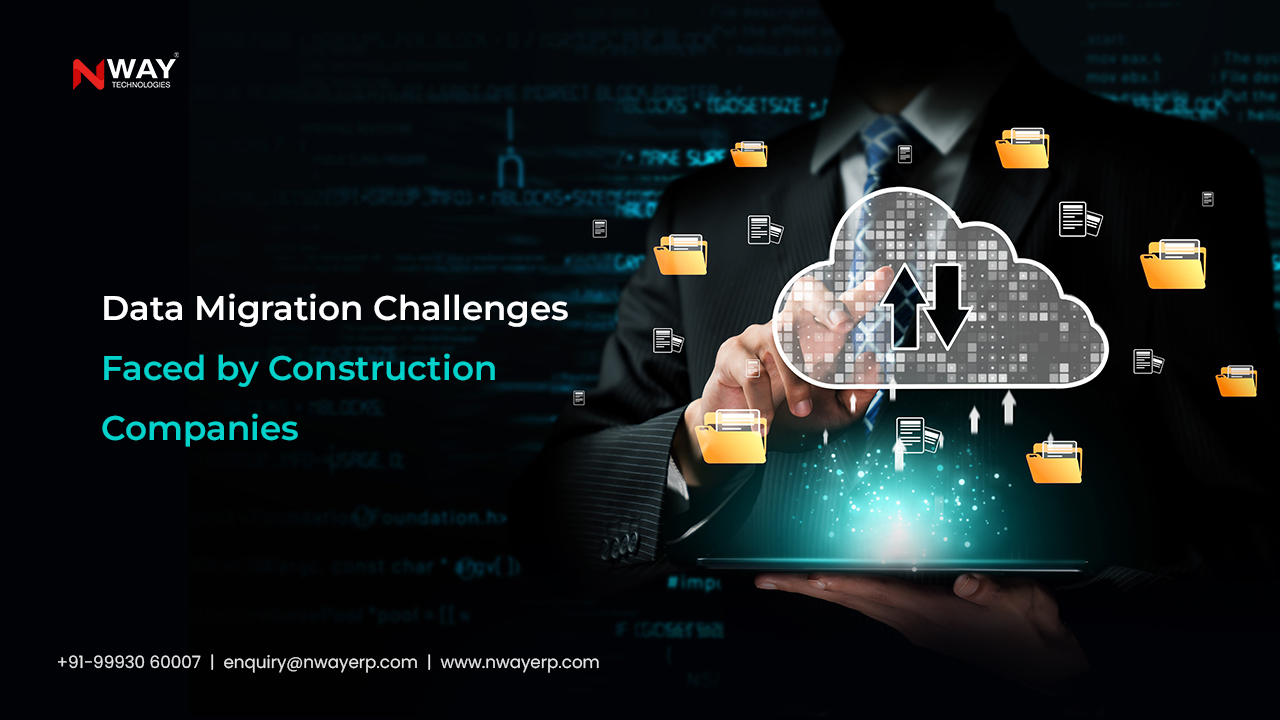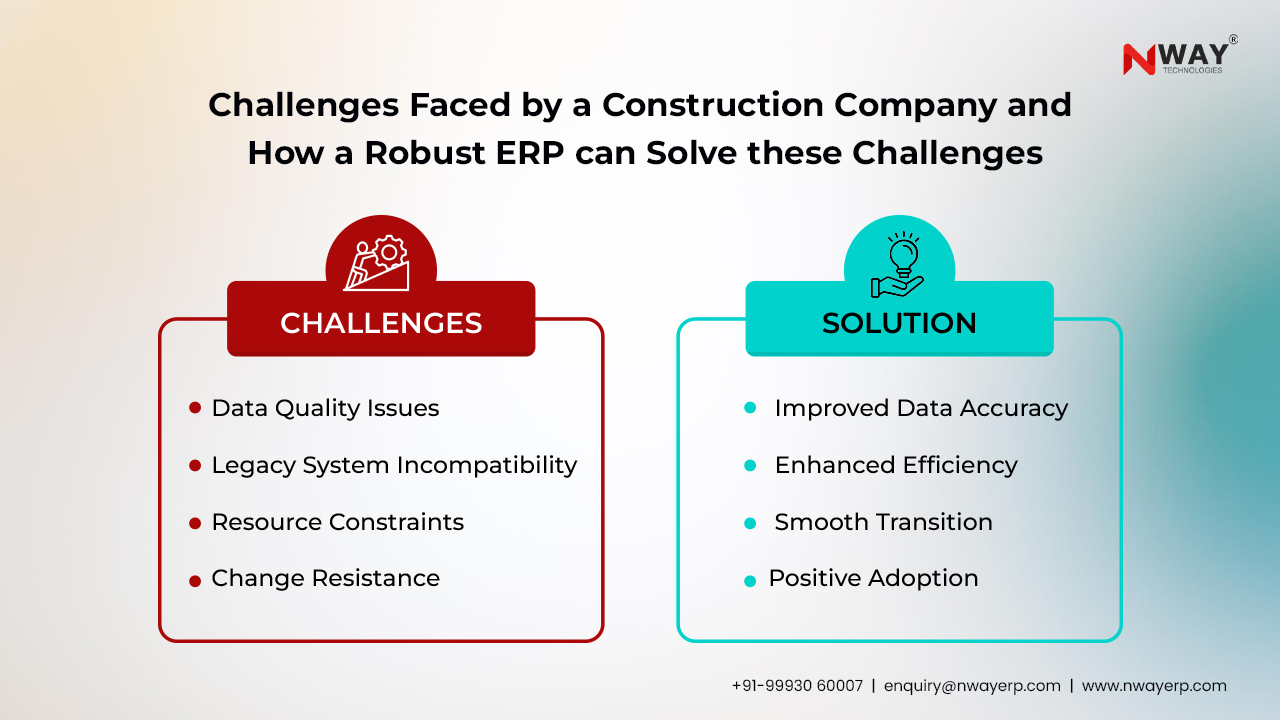In today’s digital era, business industries are eagerly adopting technologies to help expand and automate major operations. Construction companies worldwide are also opting for technologies like ERP to streamline their major operations and enhance efficiency. Meanwhile, switching to new technology or opting for a new ERP in construction involves various data migration challenges.
Let’s explore the common data migration challenges faced by construction companies and how a good software solution with effective implementation strategies can overcome those obstacles easily.
What is Data Migration for Construction Companies?
Data migration is one of the most important phases in the implementation of an ERP system. This involves the process of transforming data from legacy systems, spreadsheets, or documents into a unified ERP software.
For the construction industry, this process is very complex as it involves vast amounts of data from different sources like various projects, sites, or locations, particularly from different departments like purchase, finance, inventory, HR, and Payroll. This involves huge risk, chances of errors, and data loss due to improper management and results in significant operational disruptions.
Construction companies need to choose a good ERP system that not only targets easing out the operations and processes but also provides smooth data migration and integration processes.
Common Data Migration Challenges in the Construction Industry
Data Quality and Integrity
Managing construction data safely is one of the primary concerns in data migration. There are multiple locations in which data must be stored in different formats. It is essential to clean the unnecessary data ensuring that only accurate and important data is migrated in the new system.
Data Volume and Complexity
The construction industry deals with large volumes of complex data, including project specifications, vendor information, and historical project data. It becomes difficult to manage this high volume of data during migration. It requires proper planning and execution to prevent data loss and ensure completeness.
Legacy Systems Compatibility
Construction Companies often use legacy systems that are not necessarily compatible with modern ERP solutions. This can create challenges in data extraction, transformation, and loading processes. This needs experts and a team of dedicated people to smoothly handle legacy systems.
Downtime and Business Continuity
Data migration often requires system downtime in some cases, this can disrupt ongoing projects and business operations. Construction companies need to manage the data migration in a way that does not affect business continuity ensuring smooth transitions at every end.
Security and Compliance
Construction companies handle sensitive data, including financial records, employee information, and proprietary project details. Ensuring data security and compliance with industry standards and regulations is necessary. It helps in preventing data breaches and legal issues.
Resource Constraints
Data migration is a resource-intensive process that needs skilled experts, personnel, time, and financial investment. There are various scenarios in which construction companies often face constraints in terms of availability making it difficult to allocate the necessary resources, manpower, and budget for successful data migration.
How Successful Implementation by a Good ERP System Can Solve Data Migration Challenges?
A robust and feature-rich ERP system provides implementation and deployment that can mitigate the challenges associated with data migration. Leveraging advanced technologies and best practices can ensure seamless data transfer. With an effective and smooth ERP implementation process, construction companies can streamline the migration process, as well as improve overall efficiency and data management.
Data Quality Assurance
It is important to emphasize advanced data cleaning techniques that ensure only accurate and relevant data is migrated to the new system. An expert implementation team should be assigned for ERP implementation that can conduct thorough data audits, identifying and rectifying inconsistencies, duplications, and errors, along with enhancing data quality checks and integrity.
Scalable Solutions for Data Volume
The ERP system you choose needs to effectively handle the large volumes of data. It should utilize scalable data migration tools and methodologies that can handle huge data files associated with construction projects ensuring accuracy at every level.
Seamless Legacy Systems Integration
The ERP in construction must integrate with a wide range of legacy systems, ensuring seamless data extraction, transformation, and loading (ETL) processes. A good team can handle various legacy systems, ensuring compatibility and smooth data migration.
Minimal Downtime and Business Continuity
A smooth implementation strategy prioritizes business continuity. Planning and executing data migration in phases is necessary, minimizing system downtime and ensuring that critical business processes can continue without interruption. Our approach ensures a smooth transition with minimal impact on ongoing business.
Robust Security and Compliance
It is a must that the ERP system you choose must prioritize data security and compliance throughout the migration process. It should employ stringent security measures, including data encryption, access controls, and compliance with industry regulations, ensuring the protection of sensitive data and mitigating the risk of breaches.
Efficient Resource Allocation
The ERP system you opt for should provide an implementation strategy with optimized resource allocation. It is also necessary to ensure that they provide you effective skills and knowledge required for successful data migration and implementation. Our scalable solutions also help in financial management and delivering maximum value.
Effective Change Management
It is important to opt for change management picking the best ERP with a successful ERP implementation. Our strategy includes proactive communication, stakeholder engagement, and training programs to facilitate the smooth implementation and deployment of the new system.
How NWAY ERP for the Construction Industry can Facilitate Data Migration and Smooth Implementation?
Various ERP vendors provide ERP for the construction industry but it is necessary to choose the best, looking after the modules they offer, the migration process followed, the implementation process, training, and after-sales support offered.
NWAY ERP stands out to be an ideal choice for any type of construction project, whether it is road construction, infrastructure, bridges, pipelines, RMC plants, stone crushers, and more. Having industry-specific expertise, comprehensive solutions, and commitment to excellence.
Here are some of the reasons to choose NWAY ERP:
Industry-Specific Expertise
NWAY ERP specializes in providing tailored solutions for the construction industry. A team of experienced professionals who understand the unique challenges and requirements faced by construction companies allows us to develop customized ERP solutions that address specific business needs.
Proven Track Record
With over 16+ years of experience and a presence in 20+ states, NWAY ERP has a proven track record of successful ERP implementations and data migrations. We have served over 200 clients, delivering robust and reliable solutions that enhance operational efficiency and productivity.
Comprehensive Support and Training
At NWAY ERP, the implementation strategy is planned in a way that it should stand out, including comprehensive support and training programs ensuring that your team is fully equipped to use the new ERP systemeffectively. It also offers continuous support eliminating ongoing challenges to adapt to new processes and workflows seamlessly.
Client-Centric Approach
NWAY ERP believes in building strong, long-term relationships with our clients. We take a client-centric approach, targeting unique needs and delivering solutions that exceed your expectations.
Conclusion
Data migration is a critical and challenging phase in the implementation of an ERP system for construction companies. The complexities of data quality, volume, legacy systems, and resource constraints can pose significant challenges.
While NWAY ERP is one of the best ERPs in the construction industry, it is designed with all the specific modules to cater to the needs of a construction project. It also offers the easiest, smooth, and effective implementation that can effectively address all the above-discussed challenges.
So if you are thinking of switching to an updated and super advanced ERP system in construction but are scared to think about the data migration challenges, we are here to help you facilitate the best implementation process across all your sites, projects, and locations. Contact us today and get a personalized demo to understand the process of taking your business to the next level.




